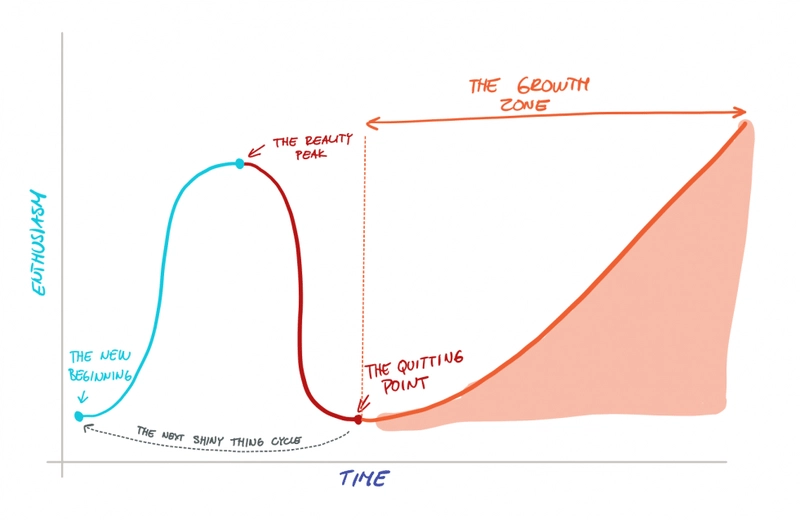Simple Tips for Starting Your Career in Software Development
Switching careers after a long time of experience in another industry and starting a new professional life is not easy, especially in competitive fields like software development. It requires not only technical skills but also a continuous learning mindset.
In this article, I won’t tell you how to find a job or recommend technical resources. Instead, I’ll share my personal methods for starting and staying motivated as a new software developer. These methods focus on three key points: setting clear goals, staying motivated, and avoiding distractions.
1. Set Clear Goals
When you decide to enter the world of software development, you’ve likely already done some research. Let’s face it: it can be overwhelming. Thousands of opinions, people claiming that “this is the best programming language!” or advice like “learn this new technology” can easily leave you confused.
Don’t assume front-end development is the easiest path. Believe me, it is not! Instead, think about what excites you. If finding mistakes or bugs sounds interesting, maybe testing is your thing.
If you have no idea what interests you, don’t worry. There are thousands of articles and resources to help you explore options. Remember, not everyone needs to be a front-end developer.
Once you’ve identified your interest, the next step is to follow a clear roadmap for that area. Websites like roadmap.sh offer excellent guides. Having a structured plan will keep you focused and prevent you from getting lost in the vast ocean of possibilities. With each step you complete, your next move will become clear.
After setting a plan, look for educational resources. There are countless free resources available, so a bit of research can go a long way. To avoid burnout, create a personalized learning program based on your interests. I plan to share a repository listing the resources I’ve found helpful in the future, but for now, start by building your own list.
2. Stay Motivate
Having access to so many resources can sometimes feel like you’re stuck in an endless loop. Even well-meaning advice from experienced developers can confuse you. To stay on track, it’s crucial to maintain your motivation. Here are some methods that worked for me:
Pomodoro Technique: The Pomodoro Technique is a time management method where you work for 25 minutes and then take a 5-minute break. After four cycles, you take a longer 20–30 minute break. This method helps your brain stay refreshed while working.
Free tools like Pomodoro Tracker allow you to track how much time you spend on different topics and even your total learning time over the year. For example, I spent 115 hours (167 Pomodoros) completing a Full-Stack Web Development Bootcamp, including exercises and projects.Eat the Frog: This productivity method involves tackling the hardest task first thing in the morning. If you have two challenging tasks, start with the more difficult one. This approach helps prevent procrastination caused by dread.
For me, learning something new in the morning works best because my mind is fresh and free from distractions. This could be reading an article or taking detailed notes on a technical topic.To-Do Lists: A classic but effective method. Believe me, it works! When you have multiple tasks, tracking them individually simplifies the process. Crossing off completed tasks also activates a reward mechanism in your brain, giving you a sense of accomplishment.
3. Avoid Distractions
Distractions, even those that seem harmless, can significantly derail your progress.
As you dive deeper into learning and the difficulty level increases, staying consistent becomes harder. This can lead to lower self-esteem and push you towards what is called the “giving up curve” or “quitting point” — what is the hell this quitting point -

The quitting point curve from Tomas Svitorka
Social media and platforms like Instagram, LinkedIn, X can seem harmless or even helpful. However, they often trigger feelings of competition or inadequacy. Limit your exposure to these platforms during your workday.
Personally, I use “Do Not Disturb” mode on my phone and keep it out of sight during work. You’d be surprised how much mental energy it takes just to resist checking your phone.
Living away from my family, I also avoid phone calls during the day unless it’s an emergency. Emotional triggers can be hard to control and are among the most demotivating distractions.
Additionally, I follow a daily wake-up routine with clear goals for the day. This helps me wake up with purpose and builds a long-term sense of self-appreciation. Remember, self-recognition is a powerful motivator. Competing with yourself will push you forward while competing with others might drain you emotionally.
Bonus: Books for Long-Term Growth
If you want to dig deeper into these ideas, here are a few books I recommend:
- The Education of the Will by Jules Payot
- Indistractable by Nir Eyal & Julie Li
- Ikigai by Héctor García & Francesc Miralles
These books cover topics like understanding distractions, building resilience, and finding purpose. For example, The Education of the Will is an eye-opener for identifying negative behaviors and learning how to combat them. Indistractable offers practical methods for managing distractions effectively. And if you feel something is still missing, Ikigai can help you find your life’s purpose.
Final Thoughts
Don’t see these tips as discouraging. Instead, think of them as tools to prepare for challenges and stay ahead. These methods aren’t guaranteed solutions but are based on my own experiences and what worked for me. Knowing what you’re up against and being prepared can make all the difference in your journey.
Good luck, and don’t forget — every step forward is progress!
Thanks for reading!



Top comments (0)